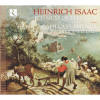Texte paru dans: / Appeared in:

Fanfare Magazine: 35:5 (05-06/2012)
Pour
s'abonner / Subscription information
Les abonnés à Fanfare Magazine ont accès aux archives du
magazine sur internet.
Subscribers to Fanfare Magazine have access to the archives of the magazine
on the net.
Ricercar
RIC318

Code-barres / Barcode:
5400439003187
Consultez toutes les évaluations recensées pour ce cd
~~~~ Reach all the evaluations located for this CD
Despite the general consensus that Isaac ranks close to and possibly alongside Josquin as a leading composer of his generation, it’s surprising how few albums are solely devoted to his music. He regularly figures in collections, both the kind that feature many short works (such as Fretwork’s selection taken from Petrucci’s Harmonice Musices Odhecaton, on Harmonia Mundi 907291), or a very few longer sacred ones—but the numbers of albums devoted to Isaac remain exceptionally slim. Capilla Flamenca, which previously included his song Innsbruck, ich muss dich lassen in its collection Oh Flanders Free: Music of the Flemish Renaissance (Naxos 8.554516), has now issued a release entirely dedicated to Isaac.
It would be both futile and anachronistic to discuss it in terms of the composer’s individuality. That was neither a goal nor an achievement of music in this period. But Isaac was noted even in his own day for an ability to compose fluently and inventively in any number of current styles, according to the requirements of his audience. This was something his patron Lorenzo de Medici commented upon during the years Isaac spent in his employ in Florence, writing Masses, motets, songs, and celebratory pieces—such as the remarkable Alla battaglia, performed here as an interesting contrafactum with the Marian text O praeclarissima. Fammi una gratia is a suave and immediately memorable Florentine carnival song; Las rauschen, written during his time spent as court composer to Maximilian I, is a typical song of the conservative German states, its melody played on the recorder while the strings weave lyrical and imaginative figurations in the three other parts. The second Agnus Dei from the so-called Missa La Spagna presents clearly the courtly tune upon which Isaac built his ingenious Mass; the motet Quis dabit capiti meo aquam? celebrates the death of Lorenzo de Medici with remarkable expressiveness in its musical imagery, rhetorical pauses, and handling of varied textures. The entire disc is like this, only missing the magnificence of his larger Mass settings, a few of which are available elsewhere.
As usual, the four-person a cappella core of Capilla Flamenca is supplemented according to the needs of the moment—in this case, lute, a single viola da gamba, and recorder. The three-person alta capella ensemble Oltremontano joins them as well for five selections. The group’s distinctive sound, which relies as much on achieving a seamless timbre as it does on vocal range (countertenor-tenor-baritone-bass), is apparent in such pieces as Innsbruck, ich muss dich lassen, heard here in a different arrangement from the Naxos disc, one that cleverly includes the Lutheran chorale it became by the mid 16th century.
With good liner notes and close, not over-reverberant sound, my only complaint is that the texts are all original language only. Translations from the Flemish, German, Latin, and Italian are supposedly available on the website, but at the time of this review they hadn’t been linked. That aside, this is as persuasive an album as you can expect to find for the music of Heinrich Isaac, and it certainly makes its case with style and ease.
Cliquez l'un ou l'autre
bouton pour découvrir bien d'autres critiques de CD
Click either button for many other reviews


